Effect of Explicit Grammar Instruction on Writing and Editing
VerifiedAdded on 2020/11/12
|6
|2662
|484
AI Summary
This assignment analyzes the effect of explicit grammar instruction on 15 Korean university students' perceptions of their writing and editing skills. The results suggest a positive impact of the intervention on both writing and editing abilities, with most students perceiving improvement in their skills.
Contribute Materials
Your contribution can guide someone’s learning journey. Share your
documents today.
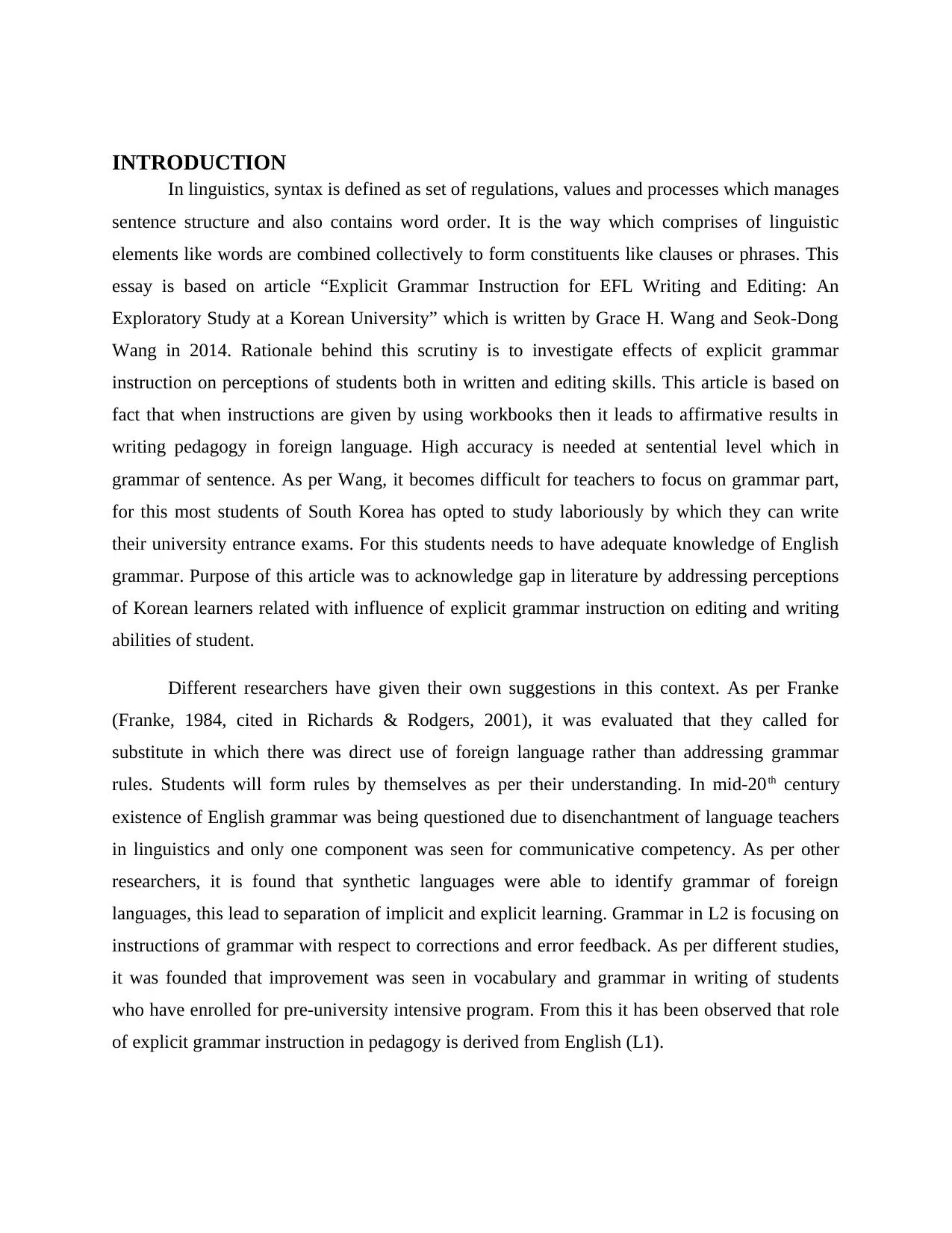
INTRODUCTION
In linguistics, syntax is defined as set of regulations, values and processes which manages
sentence structure and also contains word order. It is the way which comprises of linguistic
elements like words are combined collectively to form constituents like clauses or phrases. This
essay is based on article “Explicit Grammar Instruction for EFL Writing and Editing: An
Exploratory Study at a Korean University” which is written by Grace H. Wang and Seok-Dong
Wang in 2014. Rationale behind this scrutiny is to investigate effects of explicit grammar
instruction on perceptions of students both in written and editing skills. This article is based on
fact that when instructions are given by using workbooks then it leads to affirmative results in
writing pedagogy in foreign language. High accuracy is needed at sentential level which in
grammar of sentence. As per Wang, it becomes difficult for teachers to focus on grammar part,
for this most students of South Korea has opted to study laboriously by which they can write
their university entrance exams. For this students needs to have adequate knowledge of English
grammar. Purpose of this article was to acknowledge gap in literature by addressing perceptions
of Korean learners related with influence of explicit grammar instruction on editing and writing
abilities of student.
Different researchers have given their own suggestions in this context. As per Franke
(Franke, 1984, cited in Richards & Rodgers, 2001), it was evaluated that they called for
substitute in which there was direct use of foreign language rather than addressing grammar
rules. Students will form rules by themselves as per their understanding. In mid-20th century
existence of English grammar was being questioned due to disenchantment of language teachers
in linguistics and only one component was seen for communicative competency. As per other
researchers, it is found that synthetic languages were able to identify grammar of foreign
languages, this lead to separation of implicit and explicit learning. Grammar in L2 is focusing on
instructions of grammar with respect to corrections and error feedback. As per different studies,
it was founded that improvement was seen in vocabulary and grammar in writing of students
who have enrolled for pre-university intensive program. From this it has been observed that role
of explicit grammar instruction in pedagogy is derived from English (L1).
In linguistics, syntax is defined as set of regulations, values and processes which manages
sentence structure and also contains word order. It is the way which comprises of linguistic
elements like words are combined collectively to form constituents like clauses or phrases. This
essay is based on article “Explicit Grammar Instruction for EFL Writing and Editing: An
Exploratory Study at a Korean University” which is written by Grace H. Wang and Seok-Dong
Wang in 2014. Rationale behind this scrutiny is to investigate effects of explicit grammar
instruction on perceptions of students both in written and editing skills. This article is based on
fact that when instructions are given by using workbooks then it leads to affirmative results in
writing pedagogy in foreign language. High accuracy is needed at sentential level which in
grammar of sentence. As per Wang, it becomes difficult for teachers to focus on grammar part,
for this most students of South Korea has opted to study laboriously by which they can write
their university entrance exams. For this students needs to have adequate knowledge of English
grammar. Purpose of this article was to acknowledge gap in literature by addressing perceptions
of Korean learners related with influence of explicit grammar instruction on editing and writing
abilities of student.
Different researchers have given their own suggestions in this context. As per Franke
(Franke, 1984, cited in Richards & Rodgers, 2001), it was evaluated that they called for
substitute in which there was direct use of foreign language rather than addressing grammar
rules. Students will form rules by themselves as per their understanding. In mid-20th century
existence of English grammar was being questioned due to disenchantment of language teachers
in linguistics and only one component was seen for communicative competency. As per other
researchers, it is found that synthetic languages were able to identify grammar of foreign
languages, this lead to separation of implicit and explicit learning. Grammar in L2 is focusing on
instructions of grammar with respect to corrections and error feedback. As per different studies,
it was founded that improvement was seen in vocabulary and grammar in writing of students
who have enrolled for pre-university intensive program. From this it has been observed that role
of explicit grammar instruction in pedagogy is derived from English (L1).
Secure Best Marks with AI Grader
Need help grading? Try our AI Grader for instant feedback on your assignments.
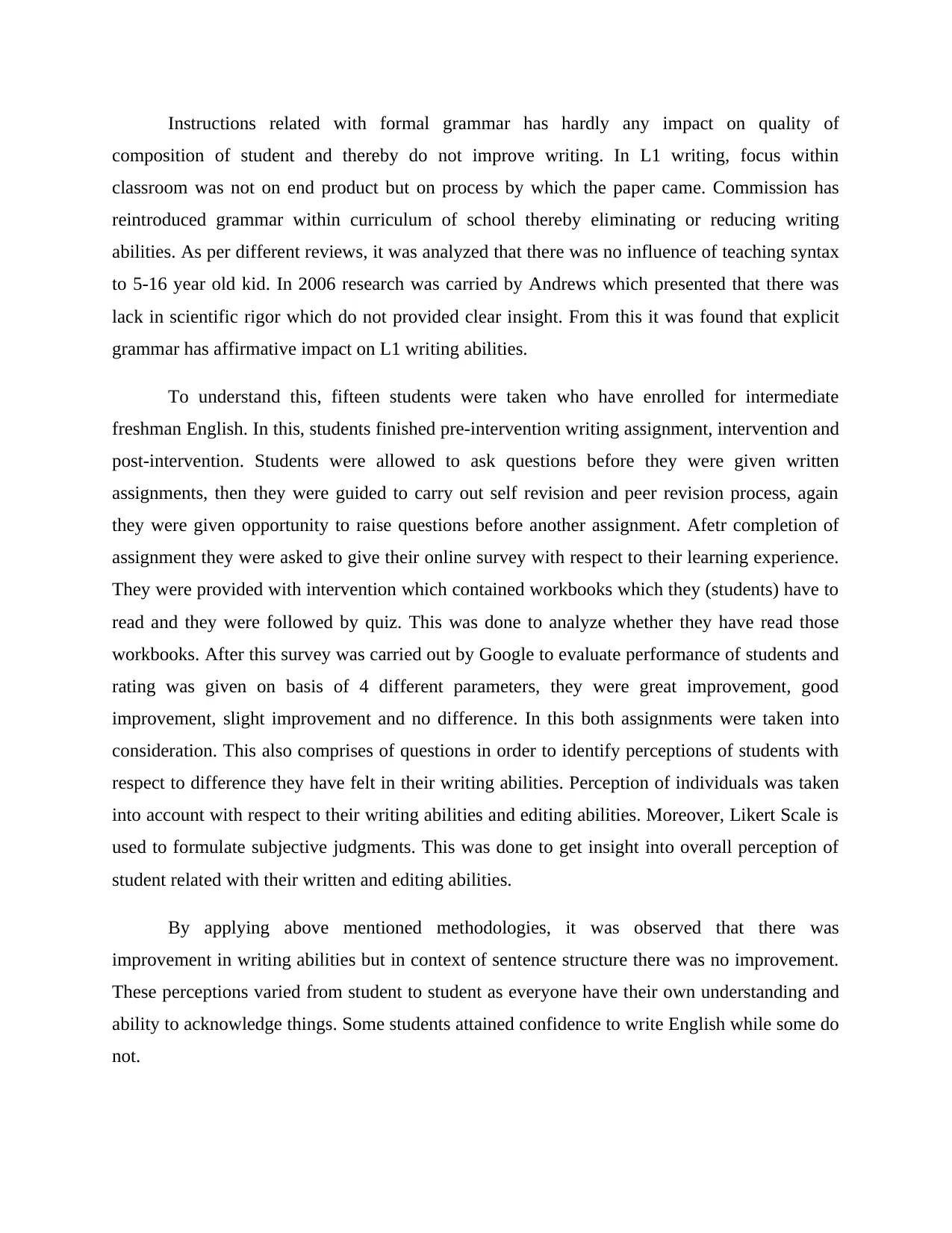
Instructions related with formal grammar has hardly any impact on quality of
composition of student and thereby do not improve writing. In L1 writing, focus within
classroom was not on end product but on process by which the paper came. Commission has
reintroduced grammar within curriculum of school thereby eliminating or reducing writing
abilities. As per different reviews, it was analyzed that there was no influence of teaching syntax
to 5-16 year old kid. In 2006 research was carried by Andrews which presented that there was
lack in scientific rigor which do not provided clear insight. From this it was found that explicit
grammar has affirmative impact on L1 writing abilities.
To understand this, fifteen students were taken who have enrolled for intermediate
freshman English. In this, students finished pre-intervention writing assignment, intervention and
post-intervention. Students were allowed to ask questions before they were given written
assignments, then they were guided to carry out self revision and peer revision process, again
they were given opportunity to raise questions before another assignment. Afetr completion of
assignment they were asked to give their online survey with respect to their learning experience.
They were provided with intervention which contained workbooks which they (students) have to
read and they were followed by quiz. This was done to analyze whether they have read those
workbooks. After this survey was carried out by Google to evaluate performance of students and
rating was given on basis of 4 different parameters, they were great improvement, good
improvement, slight improvement and no difference. In this both assignments were taken into
consideration. This also comprises of questions in order to identify perceptions of students with
respect to difference they have felt in their writing abilities. Perception of individuals was taken
into account with respect to their writing abilities and editing abilities. Moreover, Likert Scale is
used to formulate subjective judgments. This was done to get insight into overall perception of
student related with their written and editing abilities.
By applying above mentioned methodologies, it was observed that there was
improvement in writing abilities but in context of sentence structure there was no improvement.
These perceptions varied from student to student as everyone have their own understanding and
ability to acknowledge things. Some students attained confidence to write English while some do
not.
composition of student and thereby do not improve writing. In L1 writing, focus within
classroom was not on end product but on process by which the paper came. Commission has
reintroduced grammar within curriculum of school thereby eliminating or reducing writing
abilities. As per different reviews, it was analyzed that there was no influence of teaching syntax
to 5-16 year old kid. In 2006 research was carried by Andrews which presented that there was
lack in scientific rigor which do not provided clear insight. From this it was found that explicit
grammar has affirmative impact on L1 writing abilities.
To understand this, fifteen students were taken who have enrolled for intermediate
freshman English. In this, students finished pre-intervention writing assignment, intervention and
post-intervention. Students were allowed to ask questions before they were given written
assignments, then they were guided to carry out self revision and peer revision process, again
they were given opportunity to raise questions before another assignment. Afetr completion of
assignment they were asked to give their online survey with respect to their learning experience.
They were provided with intervention which contained workbooks which they (students) have to
read and they were followed by quiz. This was done to analyze whether they have read those
workbooks. After this survey was carried out by Google to evaluate performance of students and
rating was given on basis of 4 different parameters, they were great improvement, good
improvement, slight improvement and no difference. In this both assignments were taken into
consideration. This also comprises of questions in order to identify perceptions of students with
respect to difference they have felt in their writing abilities. Perception of individuals was taken
into account with respect to their writing abilities and editing abilities. Moreover, Likert Scale is
used to formulate subjective judgments. This was done to get insight into overall perception of
student related with their written and editing abilities.
By applying above mentioned methodologies, it was observed that there was
improvement in writing abilities but in context of sentence structure there was no improvement.
These perceptions varied from student to student as everyone have their own understanding and
ability to acknowledge things. Some students attained confidence to write English while some do
not.
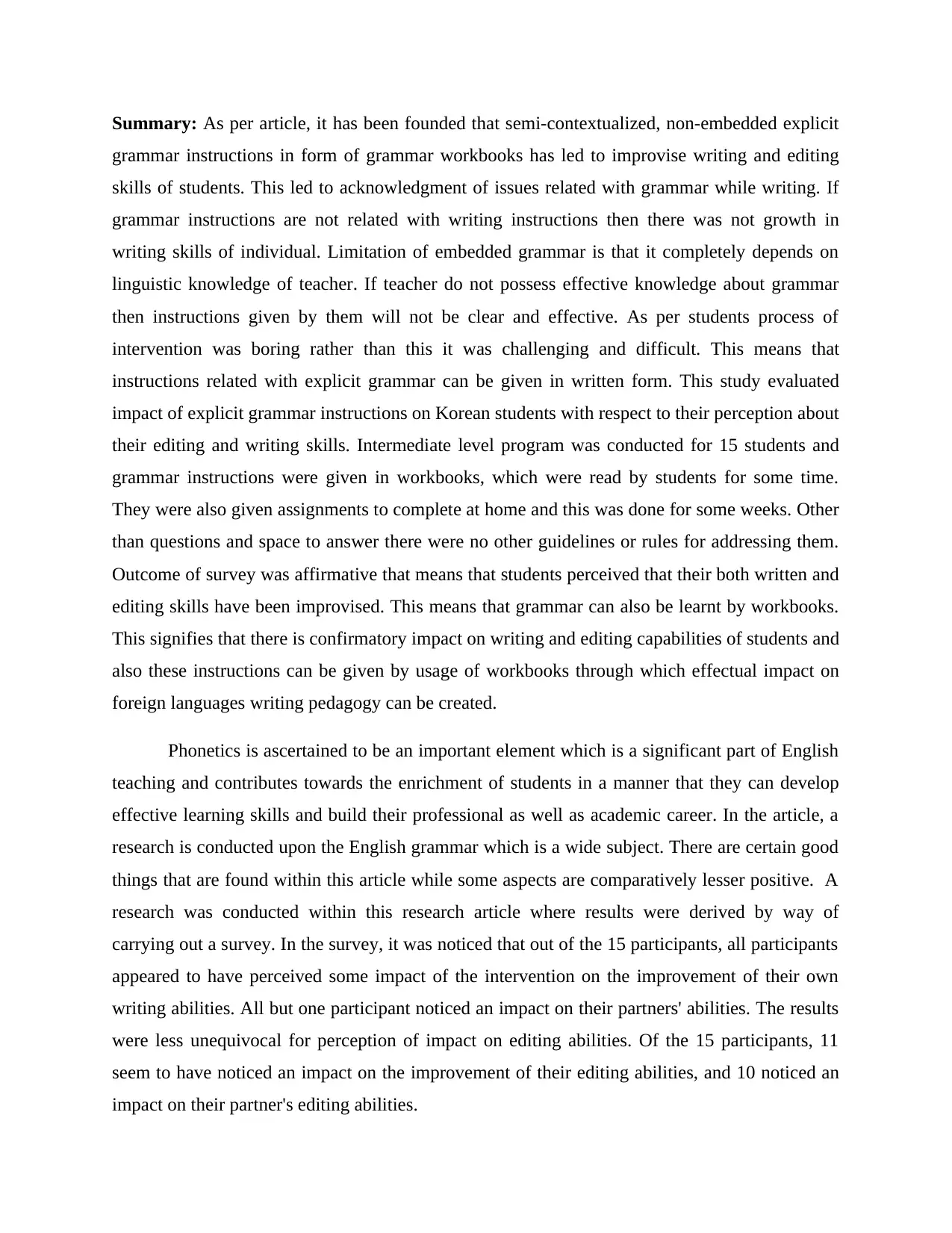
Summary: As per article, it has been founded that semi-contextualized, non-embedded explicit
grammar instructions in form of grammar workbooks has led to improvise writing and editing
skills of students. This led to acknowledgment of issues related with grammar while writing. If
grammar instructions are not related with writing instructions then there was not growth in
writing skills of individual. Limitation of embedded grammar is that it completely depends on
linguistic knowledge of teacher. If teacher do not possess effective knowledge about grammar
then instructions given by them will not be clear and effective. As per students process of
intervention was boring rather than this it was challenging and difficult. This means that
instructions related with explicit grammar can be given in written form. This study evaluated
impact of explicit grammar instructions on Korean students with respect to their perception about
their editing and writing skills. Intermediate level program was conducted for 15 students and
grammar instructions were given in workbooks, which were read by students for some time.
They were also given assignments to complete at home and this was done for some weeks. Other
than questions and space to answer there were no other guidelines or rules for addressing them.
Outcome of survey was affirmative that means that students perceived that their both written and
editing skills have been improvised. This means that grammar can also be learnt by workbooks.
This signifies that there is confirmatory impact on writing and editing capabilities of students and
also these instructions can be given by usage of workbooks through which effectual impact on
foreign languages writing pedagogy can be created.
Phonetics is ascertained to be an important element which is a significant part of English
teaching and contributes towards the enrichment of students in a manner that they can develop
effective learning skills and build their professional as well as academic career. In the article, a
research is conducted upon the English grammar which is a wide subject. There are certain good
things that are found within this article while some aspects are comparatively lesser positive. A
research was conducted within this research article where results were derived by way of
carrying out a survey. In the survey, it was noticed that out of the 15 participants, all participants
appeared to have perceived some impact of the intervention on the improvement of their own
writing abilities. All but one participant noticed an impact on their partners' abilities. The results
were less unequivocal for perception of impact on editing abilities. Of the 15 participants, 11
seem to have noticed an impact on the improvement of their editing abilities, and 10 noticed an
impact on their partner's editing abilities.
grammar instructions in form of grammar workbooks has led to improvise writing and editing
skills of students. This led to acknowledgment of issues related with grammar while writing. If
grammar instructions are not related with writing instructions then there was not growth in
writing skills of individual. Limitation of embedded grammar is that it completely depends on
linguistic knowledge of teacher. If teacher do not possess effective knowledge about grammar
then instructions given by them will not be clear and effective. As per students process of
intervention was boring rather than this it was challenging and difficult. This means that
instructions related with explicit grammar can be given in written form. This study evaluated
impact of explicit grammar instructions on Korean students with respect to their perception about
their editing and writing skills. Intermediate level program was conducted for 15 students and
grammar instructions were given in workbooks, which were read by students for some time.
They were also given assignments to complete at home and this was done for some weeks. Other
than questions and space to answer there were no other guidelines or rules for addressing them.
Outcome of survey was affirmative that means that students perceived that their both written and
editing skills have been improvised. This means that grammar can also be learnt by workbooks.
This signifies that there is confirmatory impact on writing and editing capabilities of students and
also these instructions can be given by usage of workbooks through which effectual impact on
foreign languages writing pedagogy can be created.
Phonetics is ascertained to be an important element which is a significant part of English
teaching and contributes towards the enrichment of students in a manner that they can develop
effective learning skills and build their professional as well as academic career. In the article, a
research is conducted upon the English grammar which is a wide subject. There are certain good
things that are found within this article while some aspects are comparatively lesser positive. A
research was conducted within this research article where results were derived by way of
carrying out a survey. In the survey, it was noticed that out of the 15 participants, all participants
appeared to have perceived some impact of the intervention on the improvement of their own
writing abilities. All but one participant noticed an impact on their partners' abilities. The results
were less unequivocal for perception of impact on editing abilities. Of the 15 participants, 11
seem to have noticed an impact on the improvement of their editing abilities, and 10 noticed an
impact on their partner's editing abilities.
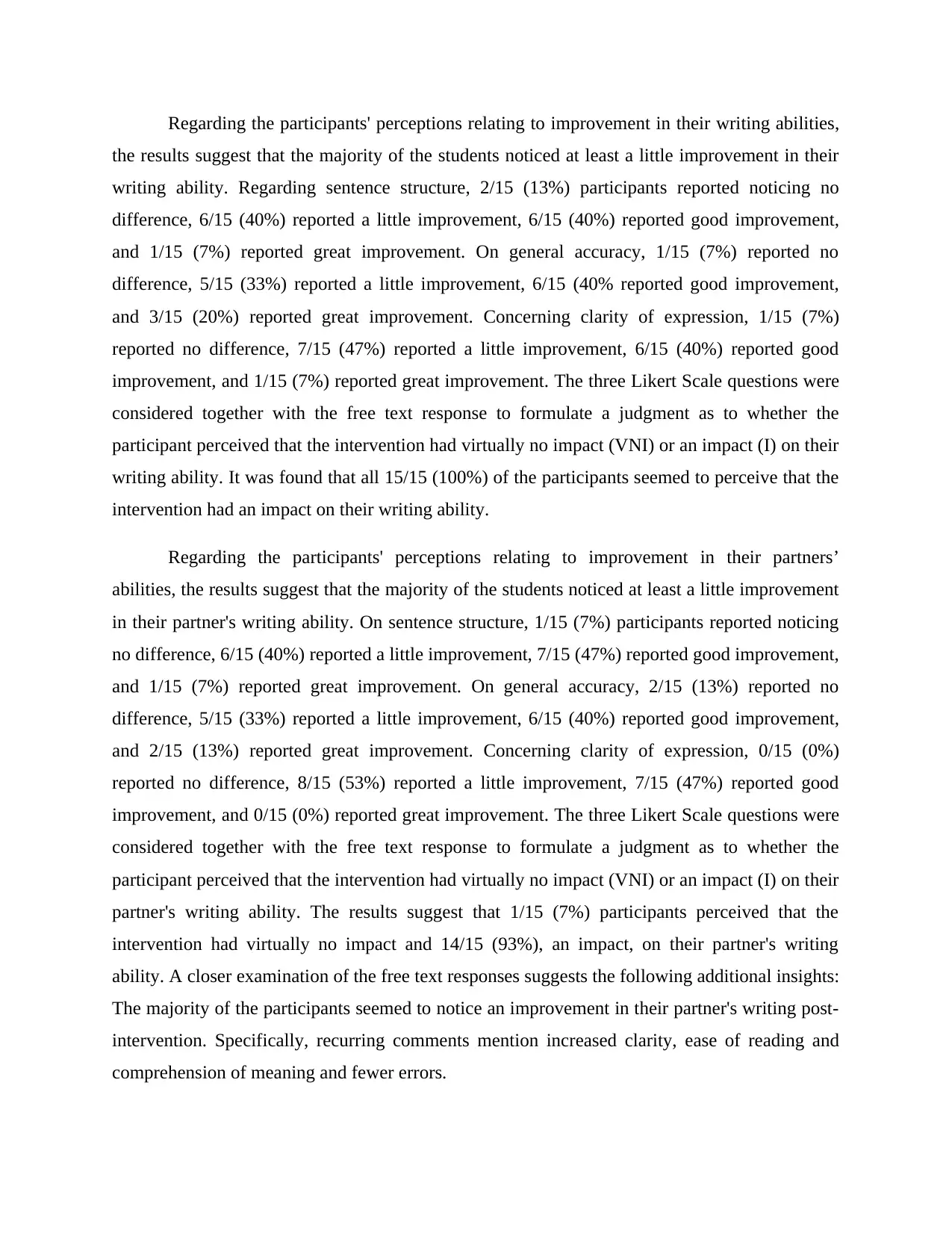
Regarding the participants' perceptions relating to improvement in their writing abilities,
the results suggest that the majority of the students noticed at least a little improvement in their
writing ability. Regarding sentence structure, 2/15 (13%) participants reported noticing no
difference, 6/15 (40%) reported a little improvement, 6/15 (40%) reported good improvement,
and 1/15 (7%) reported great improvement. On general accuracy, 1/15 (7%) reported no
difference, 5/15 (33%) reported a little improvement, 6/15 (40% reported good improvement,
and 3/15 (20%) reported great improvement. Concerning clarity of expression, 1/15 (7%)
reported no difference, 7/15 (47%) reported a little improvement, 6/15 (40%) reported good
improvement, and 1/15 (7%) reported great improvement. The three Likert Scale questions were
considered together with the free text response to formulate a judgment as to whether the
participant perceived that the intervention had virtually no impact (VNI) or an impact (I) on their
writing ability. It was found that all 15/15 (100%) of the participants seemed to perceive that the
intervention had an impact on their writing ability.
Regarding the participants' perceptions relating to improvement in their partners’
abilities, the results suggest that the majority of the students noticed at least a little improvement
in their partner's writing ability. On sentence structure, 1/15 (7%) participants reported noticing
no difference, 6/15 (40%) reported a little improvement, 7/15 (47%) reported good improvement,
and 1/15 (7%) reported great improvement. On general accuracy, 2/15 (13%) reported no
difference, 5/15 (33%) reported a little improvement, 6/15 (40%) reported good improvement,
and 2/15 (13%) reported great improvement. Concerning clarity of expression, 0/15 (0%)
reported no difference, 8/15 (53%) reported a little improvement, 7/15 (47%) reported good
improvement, and 0/15 (0%) reported great improvement. The three Likert Scale questions were
considered together with the free text response to formulate a judgment as to whether the
participant perceived that the intervention had virtually no impact (VNI) or an impact (I) on their
partner's writing ability. The results suggest that 1/15 (7%) participants perceived that the
intervention had virtually no impact and 14/15 (93%), an impact, on their partner's writing
ability. A closer examination of the free text responses suggests the following additional insights:
The majority of the participants seemed to notice an improvement in their partner's writing post-
intervention. Specifically, recurring comments mention increased clarity, ease of reading and
comprehension of meaning and fewer errors.
the results suggest that the majority of the students noticed at least a little improvement in their
writing ability. Regarding sentence structure, 2/15 (13%) participants reported noticing no
difference, 6/15 (40%) reported a little improvement, 6/15 (40%) reported good improvement,
and 1/15 (7%) reported great improvement. On general accuracy, 1/15 (7%) reported no
difference, 5/15 (33%) reported a little improvement, 6/15 (40% reported good improvement,
and 3/15 (20%) reported great improvement. Concerning clarity of expression, 1/15 (7%)
reported no difference, 7/15 (47%) reported a little improvement, 6/15 (40%) reported good
improvement, and 1/15 (7%) reported great improvement. The three Likert Scale questions were
considered together with the free text response to formulate a judgment as to whether the
participant perceived that the intervention had virtually no impact (VNI) or an impact (I) on their
writing ability. It was found that all 15/15 (100%) of the participants seemed to perceive that the
intervention had an impact on their writing ability.
Regarding the participants' perceptions relating to improvement in their partners’
abilities, the results suggest that the majority of the students noticed at least a little improvement
in their partner's writing ability. On sentence structure, 1/15 (7%) participants reported noticing
no difference, 6/15 (40%) reported a little improvement, 7/15 (47%) reported good improvement,
and 1/15 (7%) reported great improvement. On general accuracy, 2/15 (13%) reported no
difference, 5/15 (33%) reported a little improvement, 6/15 (40%) reported good improvement,
and 2/15 (13%) reported great improvement. Concerning clarity of expression, 0/15 (0%)
reported no difference, 8/15 (53%) reported a little improvement, 7/15 (47%) reported good
improvement, and 0/15 (0%) reported great improvement. The three Likert Scale questions were
considered together with the free text response to formulate a judgment as to whether the
participant perceived that the intervention had virtually no impact (VNI) or an impact (I) on their
partner's writing ability. The results suggest that 1/15 (7%) participants perceived that the
intervention had virtually no impact and 14/15 (93%), an impact, on their partner's writing
ability. A closer examination of the free text responses suggests the following additional insights:
The majority of the participants seemed to notice an improvement in their partner's writing post-
intervention. Specifically, recurring comments mention increased clarity, ease of reading and
comprehension of meaning and fewer errors.
Secure Best Marks with AI Grader
Need help grading? Try our AI Grader for instant feedback on your assignments.
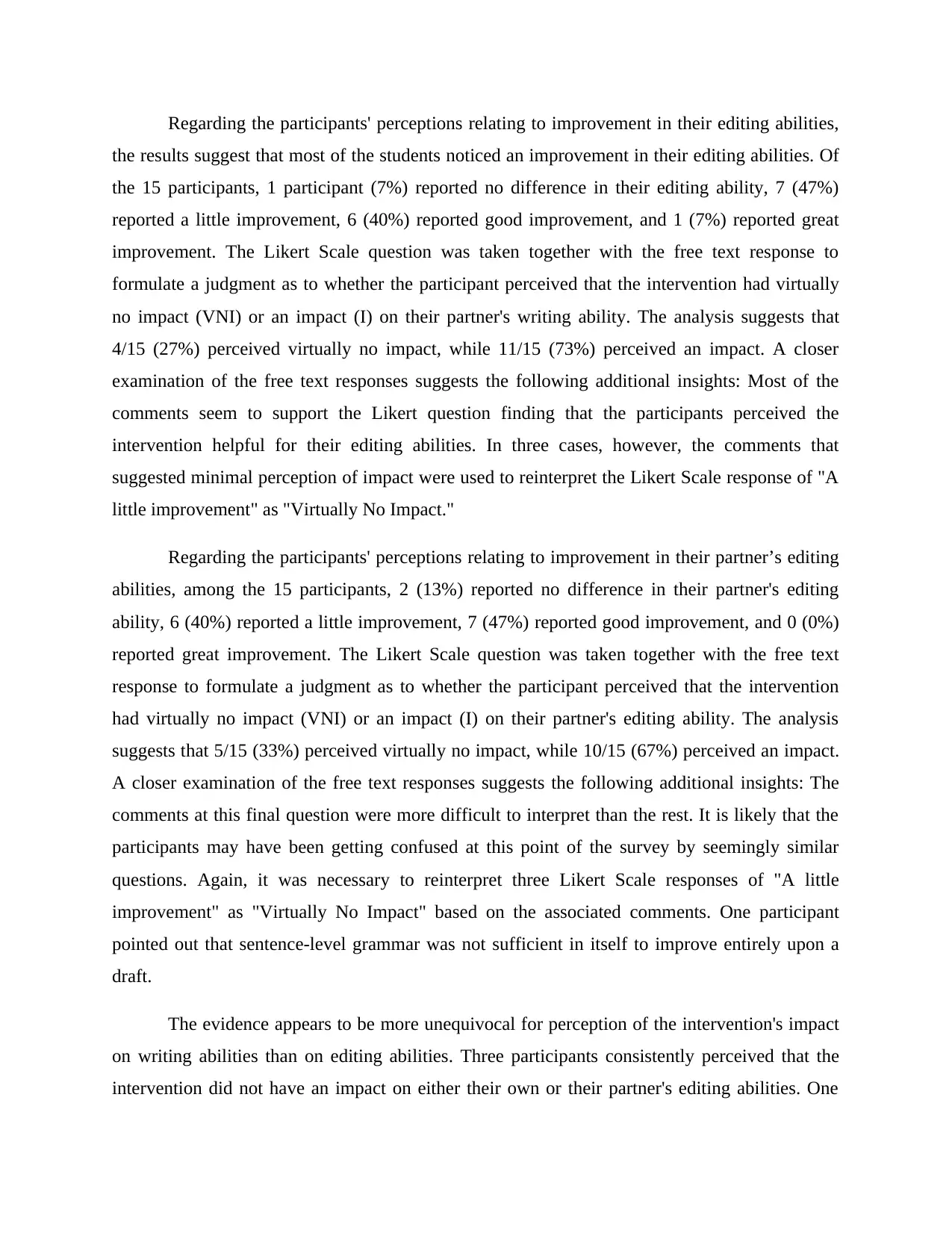
Regarding the participants' perceptions relating to improvement in their editing abilities,
the results suggest that most of the students noticed an improvement in their editing abilities. Of
the 15 participants, 1 participant (7%) reported no difference in their editing ability, 7 (47%)
reported a little improvement, 6 (40%) reported good improvement, and 1 (7%) reported great
improvement. The Likert Scale question was taken together with the free text response to
formulate a judgment as to whether the participant perceived that the intervention had virtually
no impact (VNI) or an impact (I) on their partner's writing ability. The analysis suggests that
4/15 (27%) perceived virtually no impact, while 11/15 (73%) perceived an impact. A closer
examination of the free text responses suggests the following additional insights: Most of the
comments seem to support the Likert question finding that the participants perceived the
intervention helpful for their editing abilities. In three cases, however, the comments that
suggested minimal perception of impact were used to reinterpret the Likert Scale response of "A
little improvement" as "Virtually No Impact."
Regarding the participants' perceptions relating to improvement in their partner’s editing
abilities, among the 15 participants, 2 (13%) reported no difference in their partner's editing
ability, 6 (40%) reported a little improvement, 7 (47%) reported good improvement, and 0 (0%)
reported great improvement. The Likert Scale question was taken together with the free text
response to formulate a judgment as to whether the participant perceived that the intervention
had virtually no impact (VNI) or an impact (I) on their partner's editing ability. The analysis
suggests that 5/15 (33%) perceived virtually no impact, while 10/15 (67%) perceived an impact.
A closer examination of the free text responses suggests the following additional insights: The
comments at this final question were more difficult to interpret than the rest. It is likely that the
participants may have been getting confused at this point of the survey by seemingly similar
questions. Again, it was necessary to reinterpret three Likert Scale responses of "A little
improvement" as "Virtually No Impact" based on the associated comments. One participant
pointed out that sentence-level grammar was not sufficient in itself to improve entirely upon a
draft.
The evidence appears to be more unequivocal for perception of the intervention's impact
on writing abilities than on editing abilities. Three participants consistently perceived that the
intervention did not have an impact on either their own or their partner's editing abilities. One
the results suggest that most of the students noticed an improvement in their editing abilities. Of
the 15 participants, 1 participant (7%) reported no difference in their editing ability, 7 (47%)
reported a little improvement, 6 (40%) reported good improvement, and 1 (7%) reported great
improvement. The Likert Scale question was taken together with the free text response to
formulate a judgment as to whether the participant perceived that the intervention had virtually
no impact (VNI) or an impact (I) on their partner's writing ability. The analysis suggests that
4/15 (27%) perceived virtually no impact, while 11/15 (73%) perceived an impact. A closer
examination of the free text responses suggests the following additional insights: Most of the
comments seem to support the Likert question finding that the participants perceived the
intervention helpful for their editing abilities. In three cases, however, the comments that
suggested minimal perception of impact were used to reinterpret the Likert Scale response of "A
little improvement" as "Virtually No Impact."
Regarding the participants' perceptions relating to improvement in their partner’s editing
abilities, among the 15 participants, 2 (13%) reported no difference in their partner's editing
ability, 6 (40%) reported a little improvement, 7 (47%) reported good improvement, and 0 (0%)
reported great improvement. The Likert Scale question was taken together with the free text
response to formulate a judgment as to whether the participant perceived that the intervention
had virtually no impact (VNI) or an impact (I) on their partner's editing ability. The analysis
suggests that 5/15 (33%) perceived virtually no impact, while 10/15 (67%) perceived an impact.
A closer examination of the free text responses suggests the following additional insights: The
comments at this final question were more difficult to interpret than the rest. It is likely that the
participants may have been getting confused at this point of the survey by seemingly similar
questions. Again, it was necessary to reinterpret three Likert Scale responses of "A little
improvement" as "Virtually No Impact" based on the associated comments. One participant
pointed out that sentence-level grammar was not sufficient in itself to improve entirely upon a
draft.
The evidence appears to be more unequivocal for perception of the intervention's impact
on writing abilities than on editing abilities. Three participants consistently perceived that the
intervention did not have an impact on either their own or their partner's editing abilities. One
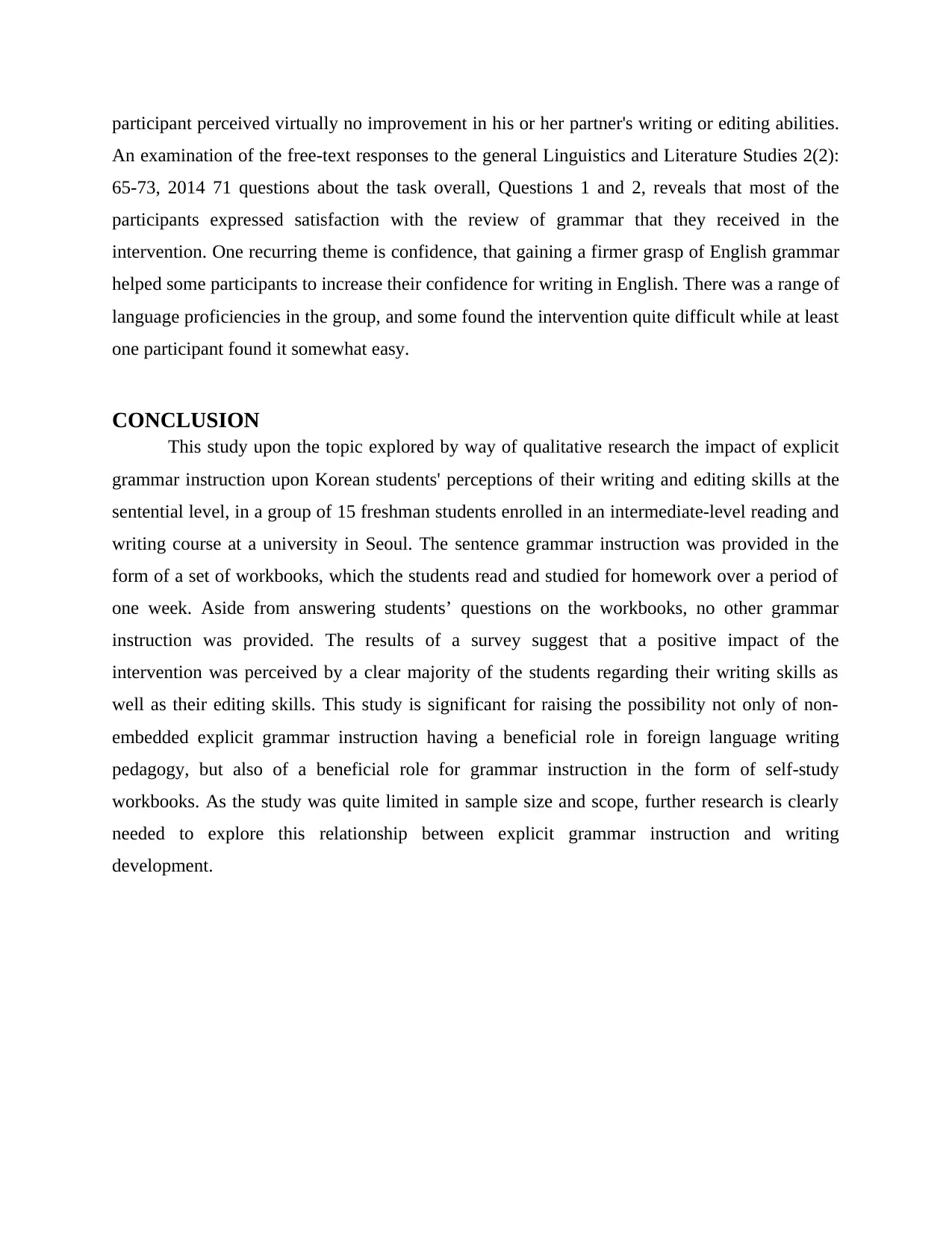
participant perceived virtually no improvement in his or her partner's writing or editing abilities.
An examination of the free-text responses to the general Linguistics and Literature Studies 2(2):
65-73, 2014 71 questions about the task overall, Questions 1 and 2, reveals that most of the
participants expressed satisfaction with the review of grammar that they received in the
intervention. One recurring theme is confidence, that gaining a firmer grasp of English grammar
helped some participants to increase their confidence for writing in English. There was a range of
language proficiencies in the group, and some found the intervention quite difficult while at least
one participant found it somewhat easy.
CONCLUSION
This study upon the topic explored by way of qualitative research the impact of explicit
grammar instruction upon Korean students' perceptions of their writing and editing skills at the
sentential level, in a group of 15 freshman students enrolled in an intermediate-level reading and
writing course at a university in Seoul. The sentence grammar instruction was provided in the
form of a set of workbooks, which the students read and studied for homework over a period of
one week. Aside from answering students’ questions on the workbooks, no other grammar
instruction was provided. The results of a survey suggest that a positive impact of the
intervention was perceived by a clear majority of the students regarding their writing skills as
well as their editing skills. This study is significant for raising the possibility not only of non-
embedded explicit grammar instruction having a beneficial role in foreign language writing
pedagogy, but also of a beneficial role for grammar instruction in the form of self-study
workbooks. As the study was quite limited in sample size and scope, further research is clearly
needed to explore this relationship between explicit grammar instruction and writing
development.
An examination of the free-text responses to the general Linguistics and Literature Studies 2(2):
65-73, 2014 71 questions about the task overall, Questions 1 and 2, reveals that most of the
participants expressed satisfaction with the review of grammar that they received in the
intervention. One recurring theme is confidence, that gaining a firmer grasp of English grammar
helped some participants to increase their confidence for writing in English. There was a range of
language proficiencies in the group, and some found the intervention quite difficult while at least
one participant found it somewhat easy.
CONCLUSION
This study upon the topic explored by way of qualitative research the impact of explicit
grammar instruction upon Korean students' perceptions of their writing and editing skills at the
sentential level, in a group of 15 freshman students enrolled in an intermediate-level reading and
writing course at a university in Seoul. The sentence grammar instruction was provided in the
form of a set of workbooks, which the students read and studied for homework over a period of
one week. Aside from answering students’ questions on the workbooks, no other grammar
instruction was provided. The results of a survey suggest that a positive impact of the
intervention was perceived by a clear majority of the students regarding their writing skills as
well as their editing skills. This study is significant for raising the possibility not only of non-
embedded explicit grammar instruction having a beneficial role in foreign language writing
pedagogy, but also of a beneficial role for grammar instruction in the form of self-study
workbooks. As the study was quite limited in sample size and scope, further research is clearly
needed to explore this relationship between explicit grammar instruction and writing
development.
1 out of 6
Your All-in-One AI-Powered Toolkit for Academic Success.
+13062052269
info@desklib.com
Available 24*7 on WhatsApp / Email
![[object Object]](/_next/static/media/star-bottom.7253800d.svg)
Unlock your academic potential
© 2024 | Zucol Services PVT LTD | All rights reserved.

